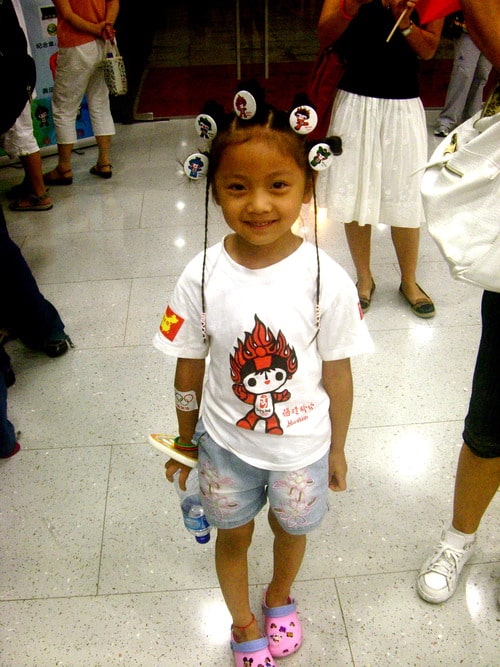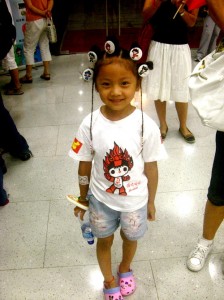Like over a billion people around the world, I recently watched the opening ceremonies of the London Summer Olympic Games. My eyes widened at the five rings being forged across the sky, I giggled at the corgis running down the staircase and Mr. Bean playing the piano, and I was transfixed at the appearances of Captain Hook and Voldemort. It was a spectacular spectacle. But the Summer Olympics, wherever and whenever they may be, will always take me back to one place: Beijing.
The first time I ever went to China coincided with China’s first-ever Olympic Games. Back in 2008, after one year learning Mandarin as a freshman in college, I decided to do a nine-week Mandarin immersion program in Beijing. Immersion meant we were bound to speaking, writing, reading, thinking, and even dreaming in Mandarin, day in and day out. We were allowed to speak English on the phone to our parents “softly” in our room—but not encouraged. If we were caught speaking English three times, the rules stated, we would be sent home. Needless to say, I wasn’t really thinking of the Olympics at the time—I was more worried about my ability to make friends with just one year of Chinese vocabulary to my name.
My first day in Beijing, there was construction everywhere and cute Olympic mascots on everything. I saw advertisements of hurdler/帥哥 Liu Xiang with his parents every time I took the subway. The track neighboring our university was closed down because the building next to it was needed to house athletes. We ran into Olympic athletes from Colombia and Sweden at XiuShuiJie 秀水街 (Silk Street), Beijing’s bargain market. I guess even athletes need knock-off Longchamp bags.
Everyone was counting down to 08.08.08, proclaimed the luckiest day in the luckiest month of the luckiest year (yes, 8 is a lucky number in China). As foreigners, people thought we were there for the Olympics. My friend was walking near campus one day and asked by some people driving by if he would like to be in an advertisement. Being not nearly as cautious as I am, he shrugged and said “keyi 可以.” He was taken in an unmarked car to a building “near a KFC,” as he told us later. There were people of all nationalities there, and all were being instructed to make different facial expressions for the camera. When he returned unscathed and told us the story, we laughed at how crazy he was. A few weeks later, the Olympic theme song “You and Me” came out—and there was our friend!
This is what the Olympics will always remind me of—the sudden joys of everyday life in Beijing. Some media in the U.S. have called China’s Olympic grandeur overdone in retrospect, finding London’s ceremonies more quirky, historical, and economical. But the grandeur is not the only thing I thought of as I turned on the TV to watch. I thought of sitting in a private room with a TV at the Beijing Peking Duck Restaurant Quanjude (全聚德), watching the ceremonies on screen with Chinese commentary and seeing the fireworks turn the sky purple through the open window. I thought of how the waiter still hadn’t come to give us our check, so we walked out of our room to find him and the entire staff of Quanjude, standing on their tiptoes or sitting on the edge of their seats, watching a projector with bated breath as the Parade of Nations walked on by. I thought of how we joined them, how they gamely cheered wildly for America, banging on pots and pans with utensils, and how when the Chinese athletes came out some of them cried. I thought of walking back to campus afterwards and feeling a city swell up—together—in anticipation and pride.
Because of all these thoughts, each time I watch the Olympics, I’ll remember Beijing, and how it really did welcome me.
就像世界上超过十亿的人一样, 我最近也看了伦敦奥运的开幕式. 我看到五环在天空出现时张大了眼睛, 当我看到柯基犬跑下阶梯和豆豆先生弹钢琴时笑了出来, 看到虎克船长和佛地魔时我呆若木鸡. 這十分叹为观止, 但是夏季奥运, 无论在哪里举行, 都会带我回到一个地方:北京
我第一次到中国是跟中国第一次举办奥运的时间相同. 2008在大一学完中文之后一年,我决定到北京参加一个九礼拜的融入中文课程。融入代表着我们每天说,写,读,思考,甚至做梦都要用中文.我们被允许在房间里小声的跟父母讲英文-但最好还是不要.有规定如果被发现说英文三次,我们就会被送回家。不用多说,我当时没有真的在想奥运-我比较担心要怎么用一年的中文能力来交朋友.
我第一次来北京时, 到处都在施工而且什么东西上都有奥运吉祥物. 在地铁上到处都是跨栏选手/帥哥刘翔和他父母的广告. 我们大学旁边的田径场被关掉因为它旁边的建筑是要让运动员住的。我们在秀水街, 北京的杀价市场, 会碰到从哥伦比亚和瑞典的奥运选手。我想甚至是运动员都需要假的水桶包。
每个人都在倒数到08.08.08, 这被称为是最吉祥的年中最吉祥的月的最吉祥的日子(没错, 8在中国是一个吉祥的数字). 至于外国人, 大家以为我们是为了奥运而在那里. 我的朋友在校园附近走路时有开车路过的人问他是否想参与一个广告. 没有像我一样小心, 他耸耸肩然后说“可以” 他被一台没有任何标记的车载到一个“靠近KFC的地方“他之后跟我们说. 那里有各种不同国籍的人而且他们被指导作不同脸部表情. 当他毫无损伤的回来之后告诉我们这个故事, 我们笑他的疯狂. 几个礼拜之后, 奥运的主题曲“我和你”出来- 我们的朋友就在那里!
这就是奥运会提醒我的事情- 在北京每天生活的愉悦. 美国媒体事后批评中国奥运的奢华, 称赞英国奥运有特色,历史价值和经济价值. 但那不是我想的. 我想到在北京烤鸭餐厅-全聚德里的房间内看有中文讲评的开幕典礼并看到烟火把天空染成了紫色. 我想到服务员还没给我们帐单, 所以我们走出去找他. 我们看到他跟所有全聚德的工作人员惦脚站着或坐在椅子边缘屏著氣息看着一个投影机放着万国游行走过. 我想到我们如何加入他们和他们兴致勃勃的并疯狂地为美国欢呼, 用器具敲着锅盘。当中国运动员出现时,有些工作人员哭了. 我想到我之后走回学校并感觉整个城市澎湃了起来,一起光荣的期待
因为这些回忆, 每次我看奥运时都会记得北京和它如何真的欢迎我.



